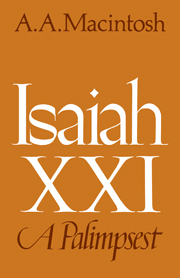Summary
History and Exegesis
Consideration of the text and meaning of the oracles of Isa. xxi and of their exegesis in relation to the historical events of the ancient Near East in the period in and after the eighth century B.C. has shown considerable diversity of opinion among scholars. Indeed it is because uncertainty attends any attempt to determine the meaning and import of so much of the text of this chapter that recourse is had to particular working hypotheses, for only by means of them can any reasonably coherent and satisfactory account of its meaning apparently be given. Thus the mention in verses 1–10 of the fall of Babylon together with an apparent reference to an attacking force of Elamites and Medes often constitutes the necessary initial clue for the construction of what I have called the orthodox critical view of this oracle. On the basis of this clue the orthodox critical school plump for the fall of Babylon at the hands of Cyrus. That is their working hypothesis. It is for them the best bet. In support of it (once it is adopted) various historical arguments are adduced. When a phrase in the text does not apparently match it, it is emended, or a different meaning is postulated for it, or other historical considerations are advanced in explanation. And what is true of the orthodox critical view as a working hypothesis is mutatis mutandis often true of alternative accounts of the prophecy, e.g. Cobb's view that the oracle is an Isaianic composition of the eighth century B.C.
- Type
- Chapter
- Information
- Isaiah XXIA palimpsest, pp. 103 - 130Publisher: Cambridge University PressPrint publication year: 1980



